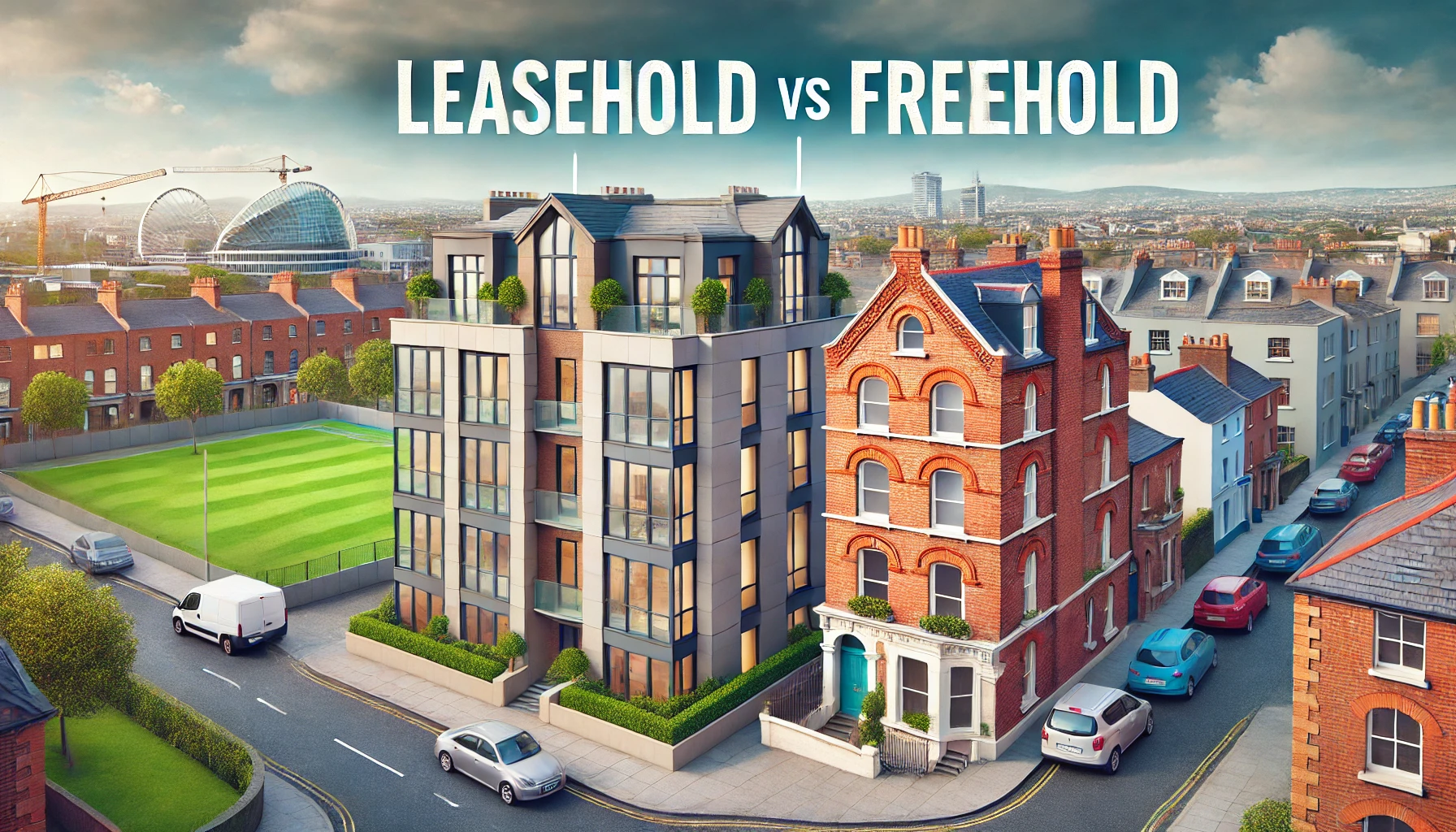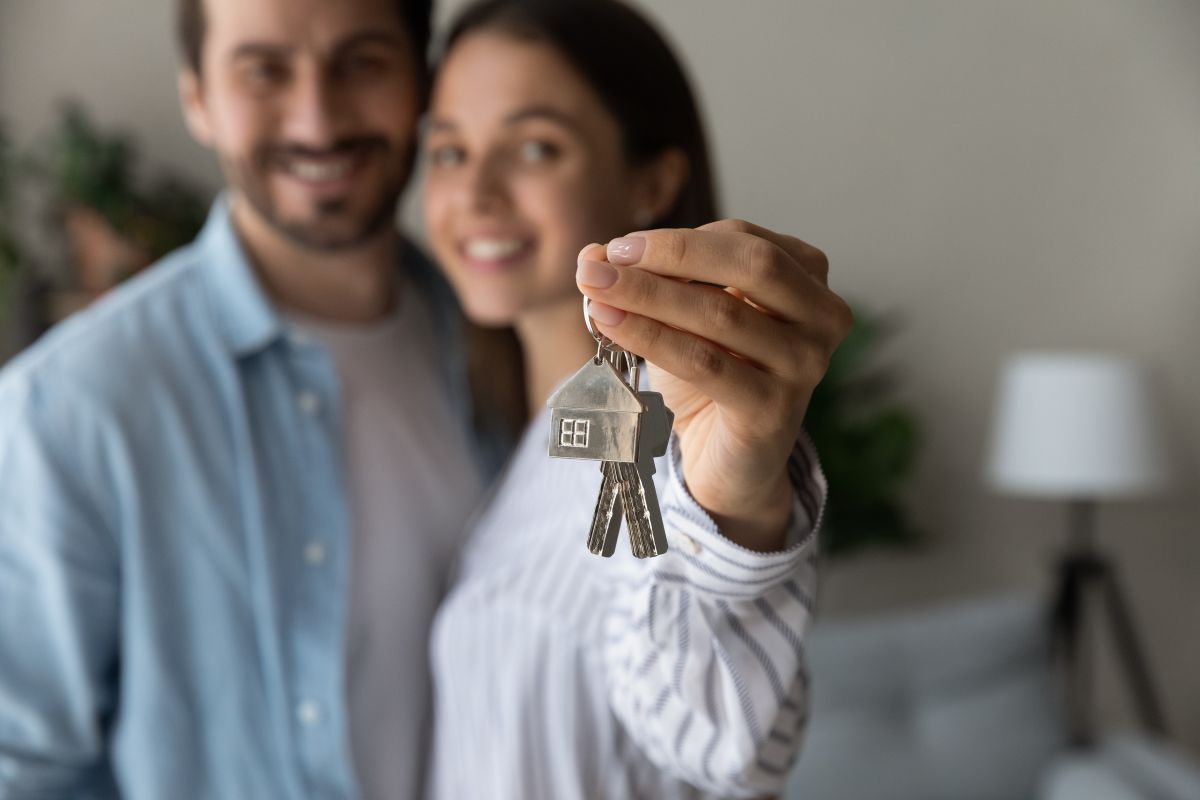When you’re buying a property in Ireland, one of the terms you’ll come across is whether the property is leasehold or freehold. Understanding the leasehold vs freehold meaning and their implications can help you make an informed decision. This guide breaks down everything you need to know about leasehold and freehold properties, including their impact on mortgages, and which might be the right choice for you.
What is Leasehold and Freehold?
When purchasing property in Ireland, understanding the distinction between leasehold and freehold is essential. These terms relate to property ownership and dictate your rights and responsibilities as the owner.
What Does Freehold Mean? What is a Freehold Property?
A freehold property means you own the building and the land it stands on outright. This ownership is indefinite and doesn’t rely on agreements with other parties. For homeowners, freehold is often seen as the “gold standard” of property ownership because it gives you full control over your home and the land.
What Does Leasehold Mean? What is a Leasehold Property?
A leasehold property means you own the building but not the land it stands on. Instead, you lease the land from the freeholder (or landlord) for a set period, which can range from decades to centuries. The lease agreement dictates your rights and responsibilities, including any ground rent or service charges. This leasehold definition is crucial when evaluating the terms of property ownership.
Key Differences Between Freehold and Leasehold in Ireland
Understanding the distinction between freehold and leasehold properties is crucial for making informed real estate decisions in Ireland. These two types of property ownership differ significantly in terms of rights, responsibilities, and restrictions. Below, we break down the key differences to help you navigate the specifics of property ownership in Ireland.
- Ownership: With freehold, you own the land and property. With leasehold, you own only the property, not the land.
- Timeframe: Freehold ownership is perpetual, while leasehold ownership lasts for the duration of the lease.
- Responsibilities: Freehold owners are responsible for maintaining the property and land. Leasehold owners may have additional obligations, such as paying ground rent and adhering to lease terms.
- Restrictions: Leasehold properties often come with restrictions, such as requiring permission for renovations or subletting.
How to Check if a Property is Leasehold or Freehold
When purchasing a property, your solicitor will investigate whether it is leasehold or freehold as part of the conveyancing process. If the property is leasehold, they will review the lease agreement to ensure the terms are acceptable and the lease has sufficient time remaining (usually over 70 years).
You can also check if a property is leasehold or freehold by reviewing property listings or consulting the estate agent. Always double-check with your solicitor for confirmation.
Pros and Cons of Leasehold vs Freehold Property
Let’s explore the pros and cons of leasehold properties and compare them with the pros and cons of freehold properties, offering a detailed perspective on both ownership types.
Pros of Leasehold Properties
- Lower Initial Costs: Leasehold properties are often cheaper than freehold alternatives.
- Shared Maintenance: In some cases, maintenance of communal areas is shared among leaseholders, reducing individual responsibility.
- Access to Amenities: Some leasehold properties, especially apartments, may include access to shared amenities like gyms or gardens.
Cons of Leasehold Properties
- Additional Costs: Leaseholders often pay ground rent, service charges, and other fees.
- Restrictions: The lease agreement may limit how you use the property.
- Lease Expiry: As the lease period decreases, the property’s value may decline, and renewing a lease can be costly.
Pros of Freehold Properties
- Full Ownership: In a freehold property you own the property and land outright, offering greater autonomy.
- No Ground Rent: In freehold properties there are no ongoing lease-related fees.
- Freedom: With a freehold property you have more flexibility to renovate or modify the property as you see fit.
Cons of Freehold Properties
- Higher Cost: Freehold properties tend to be more expensive upfront.
- Full Responsibility: You are solely responsible for all maintenance and repairs in a freehold property.
Impact on Mortgages for Leasehold and Freehold Properties
The type of property ownership in Ireland can affect your mortgage options. Lenders often prefer freehold properties due to their straightforward nature. For leasehold properties, lenders consider factors like the lease’s remaining term. In Ireland, most lenders require at least 70 years remaining on a lease at the end of the mortgage term.
Obtaining a mortgage on leasehold property can be more complex if the lease term is short. Discussing your options with a mortgage broker can help you navigate these complexities and find the best solution for your situation. If you’re unsure about how much you can borrow, our detailed guide on how much you can borrow will provide some clarity.
Freehold vs Leasehold Properties in Ireland
In Ireland, freehold properties are more common, particularly in rural areas. However, in urban centres like Dublin, Cork, and Galway, leasehold properties are more prevalent, especially for apartments and commercial units. Dublin, in particular, has a higher concentration of leasehold properties due to its dense housing market and significant developments in the past century.
Understanding the freehold vs leasehold price difference and the mortgage amount you qualify for can help you set realistic expectations when searching for a property. For more insight into the mortgage lending rules in Ireland, check out our comprehensive overview.
What is Best for You: Leasehold or Freehold?
Deciding between leasehold and freehold depends on your circumstances and priorities. If you value autonomy and long-term security, a freehold property may be the better choice. On the other hand, if you’re looking for a more affordable option or prefer shared maintenance, a leasehold property could suit your needs.
Consider your budget, long-term goals, and the property’s location when making your decision. Understanding what leasehold property means and what freehold ownership entails will help you make the right choice.
Discuss Your Freehold and Leasehold Mortgage Needs with Experts
Navigating the complexities of freehold and leasehold ownership can be challenging, especially when it comes to securing a mortgage. That’s where MortgageLine comes in. As Ireland’s leading mortgage broker, we work with a range of lenders to help you find the best deal for your unique needs. Whether you’re buying a leasehold apartment in Dublin or a freehold house in rural Ireland, our team of experts is here to guide you every step of the way. We also provide tailored advice on the mortgages available for first time buyers, ensuring you’re well-prepared for your journey.
How MortgageLine Can Help
At MortgageLine, we understand that every property purchase is unique. Our team provides personalized advice to help you navigate the differences between leasehold and freehold properties. From securing a mortgage to understanding the terms of ownership, we’re here to make the process as smooth as possible.
With access to lenders like Bank of Ireland, Haven Mortgages, and ICS Mortgages, we ensure you’re getting the best options for your circumstances. Whether you’re a first-time buyer, moving home, or switching mortgages, MortgageLine has the expertise to support you.
Ready to start your journey? Contact MortgageLine today to discuss your mortgage needs and take the next step toward owning your dream property!
Frequently Asked Questions
Is buying freehold better than leasehold?
The answer depends on your personal circumstances. Freehold properties offer full ownership and autonomy, making them a better option for long-term stability. However, leasehold properties may be more affordable upfront and can be ideal for buyers who prefer shared responsibilities, such as in apartment complexes.
Is leasehold legal in Ireland?
Yes, leasehold ownership is entirely legal in Ireland and is a common form of property ownership, particularly in urban areas like Dublin. Leasehold agreements are governed by Irish property laws, which protect the rights of both leaseholders and freeholders.
What happens at the end of a leasehold in Ireland?
When a leasehold reaches the end of its term, ownership of the property typically reverts to the freeholder unless the lease is renewed. Leaseholders can negotiate to extend their lease before it expires, often for a fee. It’s essential to check the terms of your lease and consult a solicitor to understand your options.
Ready to start your journey? Contact MortgageLine today to discuss your mortgage needs and take the next step toward owning your dream property!






